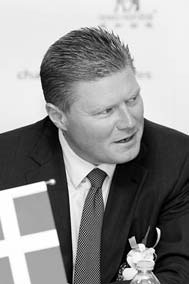Investment
Novo Nordisk aims to double R&D staff
By Liu Jie (China Daily)
Updated: 2010-09-15 07:51
 |
Large Medium Small |
|
Jesper Brandgaard, CFO of Novo Nordisk |
BEIJING - Diabetes-focused pharmaceutical company Novo Nordisk plans to double its research and development (R&D) capability in China within three to five years, to meet demand in its fastest-growing market and develop tailored solutions for Chinese over the longer term.
Jesper Brandgaard, chief financial officer of the Denmark-based company, said Novo Nordisk would expand its R&D staff in China from 100 to 200.
The company already rented a laboratory in Beijing, and the R&D capability enhancements will also involve equipment and material stocking and personel training. Equipment investment will be between $30 to 40 million.
The R&D center in Beijing is Nova Nordisk's largest such facility outside its headquarters in Copenhagen.
Its Seattle unit in the United States is the second largest R&D unit outside its home base.
"We were the first international pharmaceutical company to set up an R&D center in China - in Beijing 13 years ago," said Brandgaard.
The center was first set up to enhance Novo Nordisk's global R&D activity.
With diabetes cases on the rise in China, the center turned to studying the Chinese population and identifying differences in the gene structure between westerners and easterners.
Around two years ago, it started strengthening local research, while contributing technologies for global applications.
According to Wang Baoping, vice-president and head of the company's Beijing R&D facility, the company hopes to develop drugs or solutions tailored to the Chinese populace.
"It's a long-term goal and may take more than 10 years," Wang said.
China now has the second-largest number of diabetes patients after India. Nearly 40 million Chinese suffer from the chronic condition. The number is expected to touch 59 million, with 1 million cases being added each year, according to the Ministry of Health.
The R&D expansion plan is in line with the trend seen among multinational drug makers who are eyeing the huge clinical database and high-quality talent pool in the nation, Yu Deming, president of China Pharmaceutical Enterprises Association, said.
Swiss pharmaceutical company Novartis said it planned to invest $1 billion in the next five years to establish its third-largest global R&D center in Shanghai.
The center will cooperate with local universities and research institutions to do basic research on new medicines targeting diseases with high incidence rates in China.
Merck Serono announced in March that it would inject 150 million euros ($193 million) to set up a global R&D center in Beijing after similar facilities in Germany, Switzerland and the United States.
Chen said that those facilities would not only help the companies be near their most promising markets, but also help in reduced costs.
A recent report from PricewaterhouseCoopers has shown that the cost of clinical tests in China is around 30 percent lower than in developed nations.
If expenditures on travel, communication, quality control and administration fees were excluded, the cost differential would touch nearly 50 percent.
Novo Nordisk said its annual sales growth in China was around 30 percent, compared with no more than 20 percent globally.
The company employs nearly 3,000 people in China, around 10 percent of its workforce worldwide.
Its sales in China are expected to exceed $700 million this year, contributing to 7 percent of its global business.
China Daily
